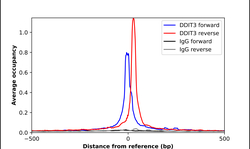Antibody data
- Antibody Data
- Antigen structure
- References [1]
- Comments [0]
- Validations
- Chromatin Immunoprecipitation [1]
Submit
Validation data
Reference
Comment
Report error
- Product number
- HPA068416 - Provider product page

- Provider
- Atlas Antibodies
- Proper citation
- Atlas Antibodies Cat#HPA068416, RRID:AB_2685985
- Product name
- Anti-DDIT3
- Antibody type
- Polyclonal
- Description
- Polyclonal Antibody against Human DDIT3, Gene description: DNA-damage-inducible transcript 3, Alternative Gene Names: CHOP, CHOP10, GADD153, Validated applications: IHC, ChIP, Uniprot ID: P35638, Storage: Store at +4°C for short term storage. Long time storage is recommended at -20°C.
- Reactivity
- Human
- Host
- Rabbit
- Conjugate
- Unconjugated
- Isotype
- IgG
- Vial size
- 100 µl
- Concentration
- 0.4 mg/ml
- Storage
- Store at +4°C for short term storage. Long time storage is recommended at -20°C.
- Handling
- The antibody solution should be gently mixed before use.
Submitted references The anti-cancer drug ABTL0812 induces ER stress-mediated cytotoxic autophagy by increasing dihydroceramide levels in cancer cells
Muñoz-Guardiola P, Casas J, Megías-Roda E, Solé S, Perez-Montoyo H, Yeste-Velasco M, Erazo T, Diéguez-Martínez N, Espinosa-Gil S, Muñoz-Pinedo C, Yoldi G, Abad J, Segura M, Moran T, Romeo M, Bosch-Barrera J, Oaknin A, Alfón J, Domènech C, Fabriàs G, Velasco G, Lizcano J
Autophagy 2020;17(6):1349-1366
Autophagy 2020;17(6):1349-1366
No comments: Submit comment
Supportive validation
- Submitted by
- Atlas Antibodies (provider)
- Main image

- Experimental details
- ChIP-Exo-Seq composite graph for Anti-DDIT3 (HPA068416, Lot A117490) tested in K562 cells. Strand-specific reads (blue: forward, red: reverse) and IgG controls (black: forward, grey: reverse) are plotted against the distance from a composite set of reference binding sites. The antibody exhibits robust target enrichment compared to a non-specific IgG control and precisely reveals its structural organization around the binding site. Data generated by Prof. B. F. Pugh´s Lab at Cornell University.
 Explore
Explore Validate
Validate Learn
Learn Immunohistochemistry
Immunohistochemistry Chromatin Immunoprecipitation
Chromatin Immunoprecipitation